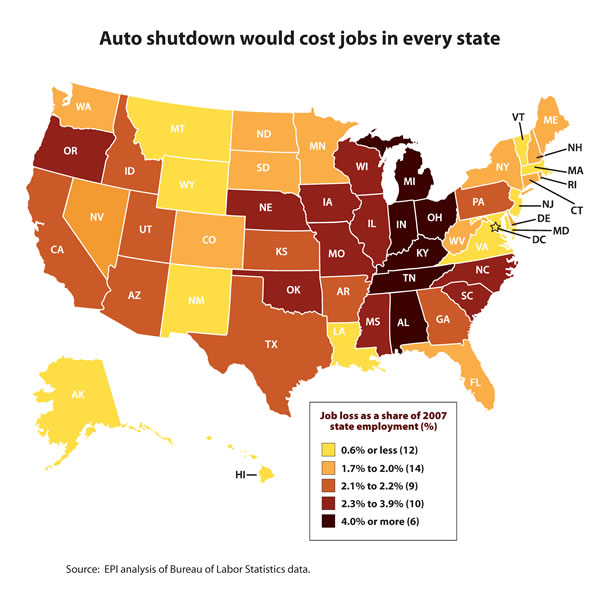Snapshot for December 17 2008.
by Robert E. Scott with research assistance from Emily Garr
The United States cannot afford to sacrifice the domestic auto industry. A shutdown would eliminate up to 3.3 million U.S. jobs within the next year in all 50 states and the District of Columbia. The loss of total state employment would be anywhere from 4.0% to 8.9% in Michigan, Indiana, Kentucky, Alabama, Tennessee, and Ohio (see Map below). Traditional auto manufacturing states would certainly be hard hit, but Southern states—including the Carolinas, Mississippi, and Oklahoma—would be, too.

Massive job losses would just be the beginning of the fallout. Widespread community disruption, loss of services, and depopulation would follow in the wake of an auto industry bankruptcy. Increased government payments and tax losses alone would exceed $150 billion in the first three years following the bankruptcy of all three domestic auto companies.1
An airline-style bankruptcy re-organization (Chapter 11) is not an option for U.S.-based automakers. U.S. consumers would abandon bankrupt car companies in droves, resulting in the widespread liquidation of company assets, dissipation of millions of highly skilled blue- and white-collar workers, and the relinquishing of the U.S. market to foreign-based car companies. Such foreign multinationals have eliminated four million U.S. jobs in the past 15 years and are directly responsible for more than one-third of the U.S. trade deficit.
Note
1. Cole, David, Sean McAlinden, Kristen Dziczek, and Debra Maranger Menk. 2008. CAR Research Memorandum: The Impact on the U.S. Economy of a Major Contraction of the Detroit Three Automakers. Ann Arbor, Mich.: Center for Automotive Research. November 4.
http://www.cargroup.org/documents/FINALDetroitThreeContractionImpact_3__000.pdf
